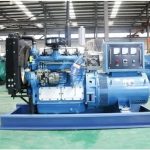The Essential Role of Diesel Generators in Temperature Testing A Comprehensive Guide

Introduction
Temperature testing plays a crucial role in various industries, including automotive, electronics, aerospace, and manufacturing. Maintaining accurate and controlled temperatures is essential to ensure product quality, reliability, and safety. In temperature testing, diesel generators are commonly used to provide a reliable power source for heating, cooling, and maintaining the desired temperature conditions. This article explores the essential role of diesel generators in temperature testing, their key features, benefits, and best practices for optimal performance.
1. Understanding Temperature Testing
Temperature testing involves subjecting a product, material, or system to specific temperature conditions to evaluate its performance, durability, and reliability under various temperature extremes. This testing is essential for assessing how a product or material will behave in real-world conditions, such as extreme heat or cold, and identifying any potential weaknesses or vulnerabilities.
There are several types of temperature testing methods, including:
- Thermal cycling: Subjecting the test specimen to alternating high and low temperatures to simulate real-world temperature fluctuations.
- Thermal shock: Exposing the test specimen to rapid temperature changes to assess its ability to withstand sudden temperature variations.
- High-temperature testing: Subjecting the specimen to elevated temperatures to evaluate its thermal resistance and performance under extreme heat conditions.
- Low-temperature testing: Exposing the specimen to freezing temperatures to assess its performance in cold environments.
2. Common issues with 400kW generators and solutions of Reliable Power Source in Temperature Testing
One of the critical factors in temperature testing is maintaining a stable and reliable power source to ensure consistent and accurate temperature control throughout the testing process. Any power interruptions or fluctuations can compromise the integrity of the test results and lead to inaccurate or unreliable data.
Diesel generators play a vital role in providing a dependable power source for temperature testing applications. Their robust design, durability, and ability to operate in challenging environments make them well-suited for powering temperature testing equipment, such as environmental chambers, ovens, and thermal shock chambers.
Key benefits of using diesel generators in temperature testing include:
- Reliable power supply: Diesel generators can provide a continuous and stable power source, ensuring uninterrupted operation of temperature testing equipment.
- Versatility: Diesel generators can be used in various temperature testing applications, including thermal cycling, high-temperature testing, and low-temperature testing.
- Portability: Diesel generators are portable and can be easily transported to different testing locations, making them ideal for on-site testing requirements.
- Fuel efficiency: Diesel generators are known for their fuel efficiency, making them a cost-effective power solution for long-duration temperature testing projects.
- Durability: Diesel generators are built to withstand harsh environmental conditions, ensuring reliable operation in extreme temperatures and challenging environments.
3. Features of Diesel Generators for Temperature Testing
When selecting a diesel generator for temperature testing applications, several key features should be considered to ensure optimal performance and reliability. Some of the essential features to look for in a diesel generator include:
- Power output: Choose a diesel generator with sufficient power output to meet the requirements of the temperature testing equipment, including heating, cooling, and temperature control systems.
- Fuel efficiency: Opt for a diesel generator that offers good fuel efficiency to minimize operating costs during extended testing periods.
- Noise levels: Consider the noise levels produced by the diesel generator, especially in indoor testing facilities where noise can impact test accuracy and worker comfort.
- Emissions compliance: Ensure that the diesel generator meets environmental regulations and emissions standards to minimize its impact on air quality and the environment.
- Remote monitoring capabilities: Look for diesel generators with remote monitoring and control features, allowing operators to monitor performance, fuel levels, and maintenance requirements remotely.
- Automatic start/stop: Choose a diesel generator with automatic start/stop functionality to ensure seamless operation and prevent power interruptions during temperature testing.
4. Best Practices for Using Diesel Generators in Temperature Testing
To ensure optimal performance and reliability when using diesel generators in temperature testing applications, it is essential to follow best practices and maintenance guidelines. Some key best practices for using diesel generators in temperature testing include:
- Regular maintenance: Perform routine maintenance tasks, such as oil changes, filter replacements, and inspections, to keep the diesel generator in optimal working condition.
- Fuel quality: Use high-quality diesel fuel and store it properly to prevent contamination and ensure efficient operation of the generator.
- Load management: Avoid overloading the diesel generator by carefully monitoring the power requirements of the temperature testing equipment and adjusting the load as needed.
- Temperature control: Maintain the diesel generator in a temperature-controlled environment to prevent overheating or cold-start issues that can impact performance.
- Emergency preparedness: Develop an emergency plan for power outages or equipment failures, including backup power sources and contingency measures to minimize disruptions to the testing process.
Conclusion

Diesel generators play a critical role in temperature testing applications, providing a reliable power source for maintaining accurate and controlled temperature conditions. By choosing the right diesel generator with essential features and following best practices for operation and maintenance, organizations can ensure optimal performance and reliability in their temperature testing processes. With their durability, versatility, and fuel efficiency, diesel generators continue to be a preferred power solution for temperature testing applications across various industries.
